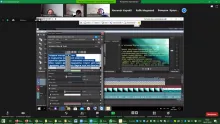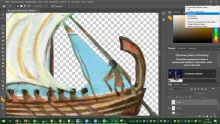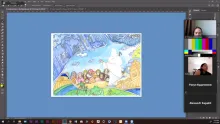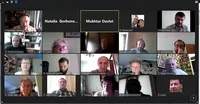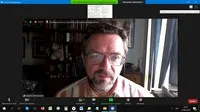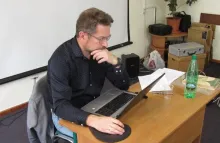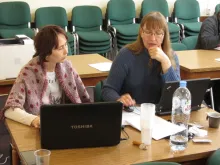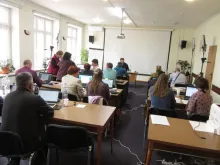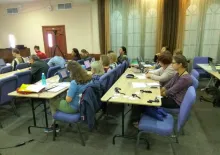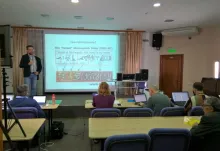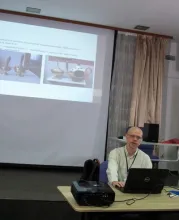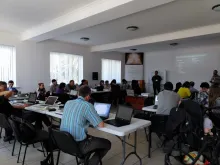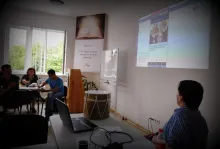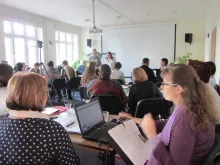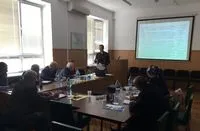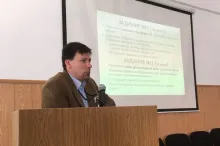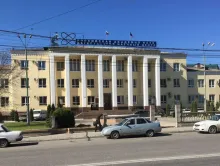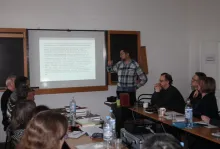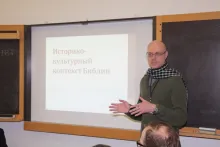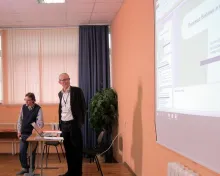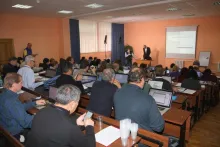news-150720
articles-22062020
IBT held a translation workshop on two of the Minor Prophets via Zoom on June 11-18. This was the first time in IBT’s history that one of our workshops has been conducted as a webinar.
The online format of this workshop was necessitated by the coronavirus pandemic and the related quarantine measures. Nevertheless, its advantages quickly became apparent. Many IBT translators are university instructors, and for them, June is traditionally a very busy time, full of summer courses and entrance exams. Translation team members who would not have been able to come to Moscow for a face-to-face seminar were still able to find time in their busy academic schedules for full participation in the virtual workshop.
news-181019
On October 9-17, the Institute for Bible Translation held a workshop on Minor Prophets Translation Issues. It was attended by translation teams from eleven language groups (Adyghe, Avar, Balkar, Erzya, Kabardian, Kumyk, Kyrgyz, Mari, Tabasaran, Tajik, and Yakut). The discussion was headed by IBT consultant Andrei Desnitsky and by Yevgeniy Shved, the exegetical advisor in several of IBT's translation projects. The workshop focused on the text and translation issues of three minor prophets (Zephaniah, Joel, Haggai).
news-181018
How should a translator approach the Pentateuch, the first five books of the Bible, called “Torah” in Hebrew? How does one begin the translation of this foundational part of the Old Testament? How can translators avoid getting buried under the many minute details in the ancient text that modern readers are usually not aware of? How can one find the spiritual and meaning core of these texts? Without a doubt, any translator of the Pentateuch must face these questions.
news-080618
In June 4-8, 2018, in the city of Nalchik, the Institute for Bible Translation held a seminar on "Translation of the Holy Scripture in Caucasian Languages: Scripture Engagement Stage". The seminar was attended by 30 participants from 9 IBT translation projects, namely Adyghe, Balkar, Dargi, Kabardian, Karachai, Ingush, Lak, Lezgi and Tabasaran.
news-301017
How does one translate in such a way that the information relevant in one culture at a certain time would be communicated with the same relevance in a different culture at a different time? What does one need to be mindful of in order to impact a contemporary audience in the same way that the original audience was impacted? What Biblical materials are relevant for a particular audience?
news-280417
IBT held a translator training seminar April 26-28 at the Tsadasa Institute of Language, Literature and the Arts in the city of Makhachkala in Dagestan. The seminar was devoted to practical language issues encountered by Bible translators. The fifteen seminar participants (primarily translators or philological editors in IBT’s translation projects) represented seven languages of the North Caucasus – Avar, Balkar, Bezhta, Dargi, Kumyk, Lak and Tabasaran.
news-171217
news-021115
How does one translate culture-specific elements found in ancient Israelite society into languages in which these concepts do not exist? How can these concepts be transferred into the new cultural context of the recipient language and how much adaptation is permissible? These questions, the focus of much scholarly discussion in contemporary Biblical studies, were the focus of IBT’s recent seminar for Bible translation teams on “Bridging the Cultural Gap Between the World of the Bible and the Languages of Russia/CIS”, held outside Moscow in late October.
newsletter-0915


